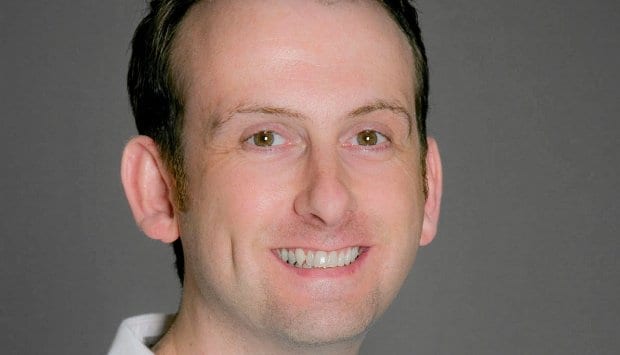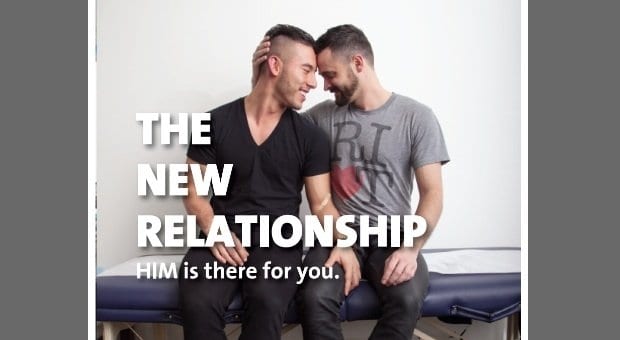
“If you think about it, men in relationships have more sex, more anal sex and are less likely to use a condom with each other,” says researcher Rob Stephenson, who helped develop the Testing Together program. Credit: Courtesy of Rob Stephenson
Researchers in the US are expanding an HIV testing program focused on testing gay men in couples, after finding that up to two-thirds of new HIV infections come from couples.
The program, called Testing Together, seeks to combat the growing rate of new HIV infections among gay men by encouraging couples to test and develop a sexual health plan together.
“Two guys go into a room and they receive pre-counselling together, they test together, they get their results together and build a plan together,” says study co-investigator Rob Stephenson, who is an associate professor at Emory University’s Rollins School of Public Health.
The program follows a 2009 study by Stephenson and co-investigator Patrick Sullivan, which estimates that one- to two-thirds of new HIV infections come from main partners among gay couples.
The pilot project was launched in 2011 in five American cities with support from the MAC AIDS Fund, which will continue to support the expanded initiative with ongoing funding. The testing program will now be available in 21 cities.
“We are 30 to 32 years into the epidemic, and those of us in prevention are really focused on the risk of casual sex and the ABCs of HIV prevention, such as abstinence, being faithful and wearing condoms,” Stephenson says. “Relationships are encouraged, but, if you think about it, men in relationships have more sex, more anal sex and are less likely to use a condom with each other.
“In our HIV-prevention method we focus on condoms for casual sex, and we almost ignore the fact that gay men form relationships and couples like any other couples. It’s frightening to a lot of people that the greatest number of new infections comes from couples.”
Stephenson says their research revealed that many gay men in relationships believed they had a low risk of acquiring HIV and were also less likely to test regularly.
“It’s kind of this relationship bubble where it’s thought that ‘because I’m in a relationship and only those out in a bar are having casual sex, so I don’t need to worry,’ but that’s not true,” Stephenson says.
“On average, guys in relationships have sex 100 times a year with their partner and, incidentally, this is the same as heterosexual couples; we’re not different,” Stephenson says. “If you’re in a relationship and you haven’t discussed your HIV status with your partner, or you assume that if he was positive he’d tell you, or if you really don’t know, then that is potentially 100 exposures a year. If you met someone on the bus and have sex with him once, that’s just one exposure. It’s very different.”
Stephenson says Testing Together was inspired by the work of the Rwanda Zambia HIV Research Group, led by Susan Allen, which provides couples’ testing and counselling across sub-Saharan Africa, where the epidemic is highest among straight couples.
“What’s fascinating is that our studies in Africa showed that the main risk is your partner,” Stephenson says. “Back in the 1980s, Susan Allen moved to Rwanda and set up the very first couples’ counselling to get tested together, and it worked. The CDC [Center for Disease Control] now labels it as a high-level intervention in that it significantly reduces HIV transmissions.
“After 25 years of success in Africa, we had this light bulb moment to say, ‘We should do this with male couples in the US doing what worked in Africa.’”
The Testing Together model will soon be available in Ontario, too, after Stephenson trains 12 facilitators from four Ontario programs that offer anonymous HIV testing and counselling.
“We were really interested in this model because nobody in Ontario is doing that at the moment, and they had such positive results in the research,” says Jean Bacon, the director of policy at the Ontario HIV Treatment Network.
“Many people they were serving wanted to be counselled as a couple, and so we want to help people develop that expertise,” Bacon continues. “There hasn’t been a lot of innovation in test counselling over the years, and I think this is very innovative.”
Bacon says she hopes the programs will be implemented shortly after training is completed next week. The service will be offered at the Hassle Free Clinic in Toronto, Options Clinic in London, Somerset West Community Health Centre in Ottawa, and Hamilton Public Health.
“We will monitor it in these agencies, and if clients like it and agencies find it has value, then we will scale it up across the province,” Bacon says.
While Vancouver’s Health Initiative for Men (HIM) has no plans to implement this particular program, executive director Wayne Robert notes that many guys already come into its clinics to get tested together.
“The nurses and people who work in our clinic are familiar with people coming in to get tested as couples,” he says. “When testing as couples, they have a way of talking about these issues that are respectful of different kinds of relationships. Most guys who come in are ‘monogamish.’ They may have one partner or only have a certain kind of sex with one partner. In all those cases, you have to manage your health given those realities.”
HIM featured couples’ testing in one of its latest poster campaigns. “Many guy guys get tested with their partners,” reads the poster, which depicts two men sitting together on an exam table. “HIM operates two health centres that offer STI & HIV testing, and counselling.”
Robert says testing as a couple is an effective way to facilitate a conversation about sexual health and overall well-being among gay men.
“It’s important to be able to discuss your HIV status with your partner, and that’s sometimes a really difficult thing for guys to bring up because it brings up issues of trust and the status of your relationship,” he says. “It’s not like people sit down and say, ‘Here are the rules about sex with me’ when they start a relationship. There are two different people with their own histories and ideas, and it’s important to talk about it, and sometimes talking about getting tested is a good starting point.”

 Why you can trust Xtra
Why you can trust Xtra


